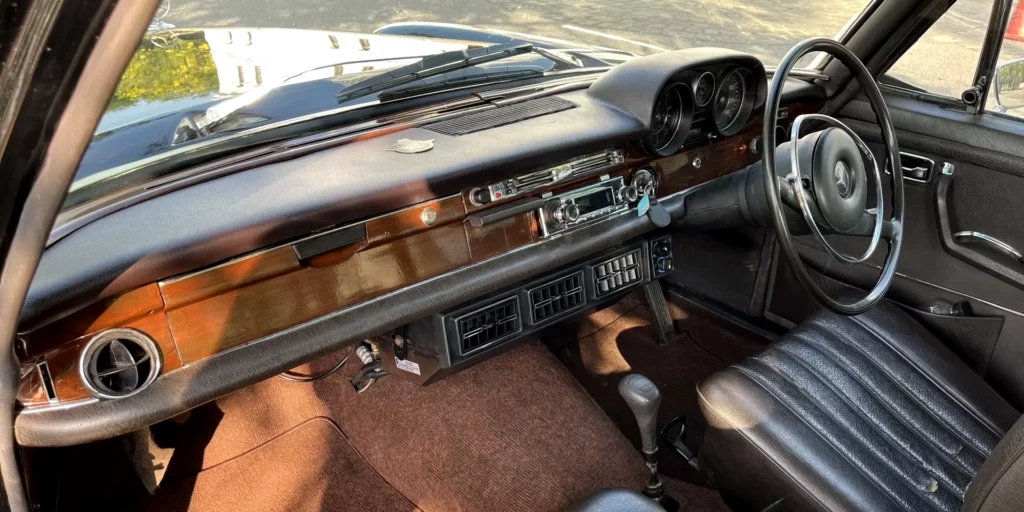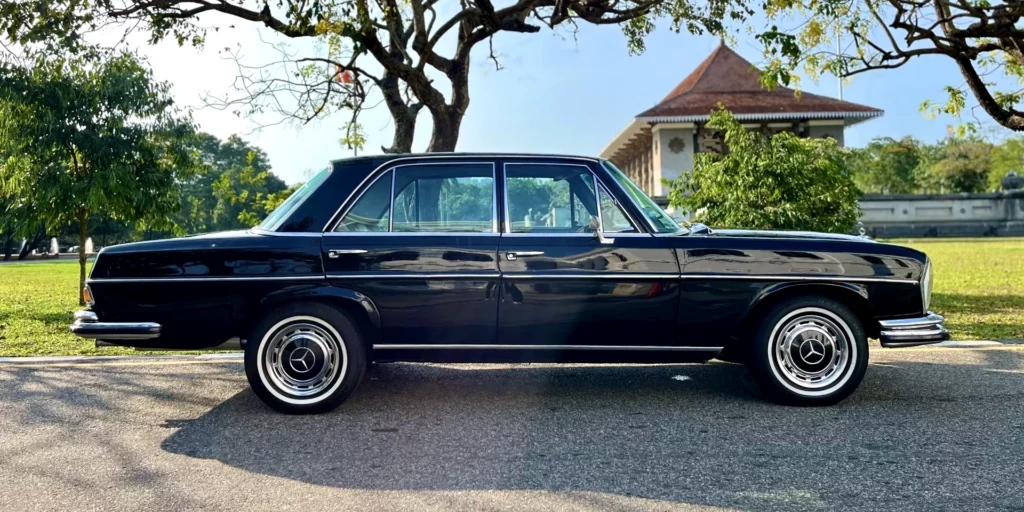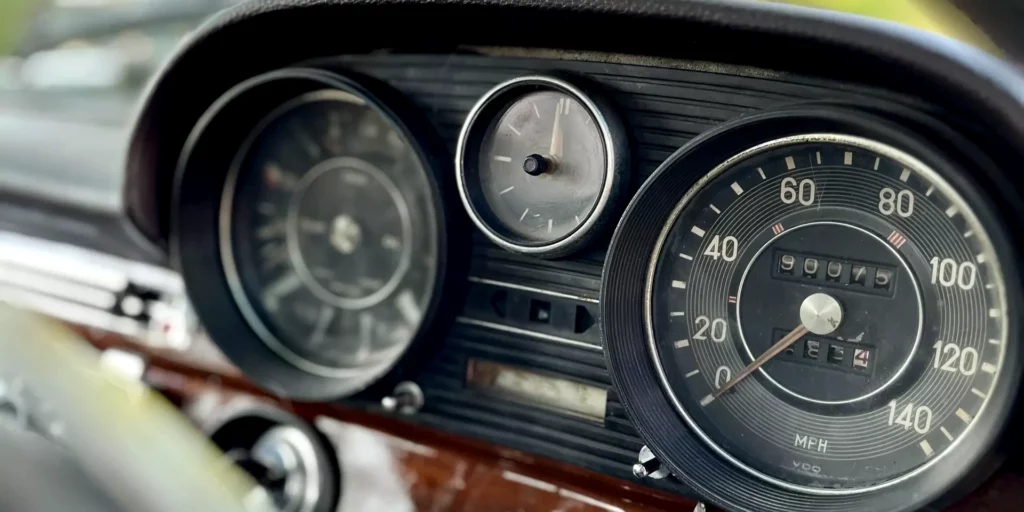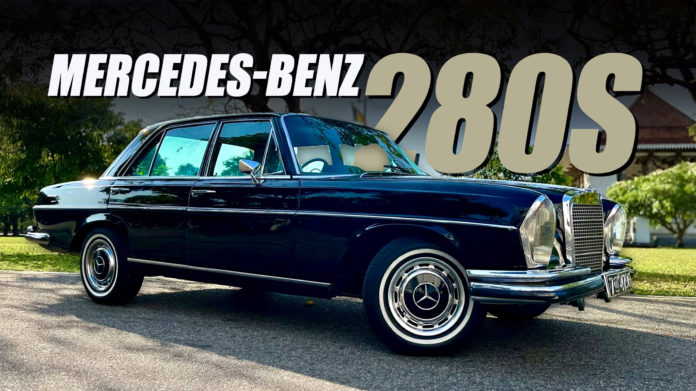Is there any industry where heritage is more important than the automotive realm? While cutting-edge tech will always garner views, there’s something to be said for the lasting legacies of individual auto manufacturers.
Granted, having a good track record may not give automakers a hall pass to rest on their laurels. History is littered with those sob stories – see British Leyland, Saab, etc. But, if combined with continued progress, cultivating that heritage enables an automotive brand to become bigger than itself. Case in point: Mercedes-Benz.
Review: Why The Alfa Romeo Alfasud Sprint Is The Forgotten FWD King
Indeed, there are few manufacturers who can claim to have the global recognition of quality and luxury that the three-pointed star has come to represent; and that’s despite a bit of a fumble in the 2000s. How has Mercedes managed to maintain this quality? Step inside the W108-generation 280S and find out.
That Old-School Mercedes Hallmark
When you get into a car like the W108-generation 280S, you instantly see why. It’s not just the quality of the materials, it’s the fit, finish, and solidity of every operation, from the reassuring thunk of a door closing to the damping on the turn signal stalk. There’s a reason why Mercedes were always considered a cut above the rest.
Quick Facts
Although the W108 predates the S-Class terminology, this shares every bit of the Sonderklasse DNA we know and love today. While the suspension does an amazing job of soaking up road imperfections, so too do the seats with their own “suspension”. If you’ve never got the chance to perch yourself into the armchairs of on older Merc, I would recommend you do so. If for nothing else, it offers an interesting look back at how trends have changed in automotive seating.
In the vast majority of modern cars, there’s a heavy emphasis on lateral support with thick love-handle-hugging bolsters; the W108 features no such thing. Instead, you’re offered a rather wide base and back, which would feel far too soft for anyone used to modern cars. But this was Mercedes at their peak. There was a method to the madness. Seats feature multiple layers of springs, each with differing gauges of metal to offer support and reduce fatigue over long journeys. They may not be any good at holding your derriere in place when taking a hard left, but the comfort they provide is an old-world example of how things were done differently.
Creamy Smooth
The 280S we got behind the wheel of is powered by a 2.8-liter straight-six engine fed by a twin carburetor. The iron lump is factory rated for 138 hp (140 PS / 103 kW) and 164 lb-ft (223 Nm). Granted, they’re not impressive figures in isolation. But with peak torque coming on stream at 3,600 rpm, you don’t need to ask too much of the engine before you’re wafted away.
See Also: Think Of This 1972 Mercedes 280SE Electric Conversion Like A Retro EQS
And waft is the most accurate description. It goes without saying, this isn’t the kind of straight-six powerplant that you’d get from the Bavarain rivals. It’s designed to offer you low-down torque and not outright power. As a result it’s incredibly creamy in its delivery, with a very even and predictable curve.
This was a car that was designed to offer a decent driving experience, sure. But passenger comfort is just as important. As such, you’re able to take off and get up to triple digits without troubling the backseat and without a buzzy engine hunting for torque. This is from an era when manual gearboxes were more commonplace than autos. The combination of the grunt with gearing spaced just right means that even with a four-speed box, the experience is enjoyable. You’re encouraged to change smoothly. The smoother, the better, lest a dipped clutch lead to m’lady’s head bobbing between shifts.

Handling may not have been high on the designer’s priority list, but this is still a Mercedes, after all. And while they may not be known as a prolific maker of dynamic chassis, you’d struggle to pick out anything that was soggy – except maybe a first-generation A-Class.
The steering wheel is naturally bigger than Peter Griffin’s dinner plate, but power assistance makes light work of low-speed maneuvers, with just the right balance of feedback when you get going. Meanwhile, body roll is presented in an endearing fashion. The W108 doesn’t list and wallow like a barge. But it does threaten to make you (or worse, your passengers) slightly queasy long before traction is broken. Predictability and pliability are the names of the game, all in the pursuit of comfort.
You’ve also got to remember the car’s weight. At 3,439 lb (1,560 kg), the 280S is roughly the weight of a modern-day Camry. But it was 300 lbs lighter than the W116 that replaced it. Agile would be overselling the car’s abilities. But saying the W108 is light on its feet would not be untrue, especially once you get used to the scale of sheet metal you’re piloting.
A Classic With Modern Usability

Despite being half a century old, the 280S is perfectly suited to modern-day traffic conditions. The smooth and torquey straight-six engine allows you to keep up with traffic, while the whisper-quiet cabin is as good as any above-average car sold today.
Thanks to servo-assisted brakes, power steering, and air conditioning (the latter being a recent retrofit to this car, but something that was offered in period), there’s every confidence that it could be run without trouble as a daily driver — just so long as you have someone who knows their way a set of platinum points and a Zenith 2-barrel carb. Regardless, this modern-day ease of use is certainly not a quality that it shares with many other cars its age.
See Also: Tire-Shredding 1968 Mercedes-Benz W108 Restomod Has 2017 AMG C63 Heart And Interior
This endearing air of luxury and longevity built the Mercedes brand name. This hallmarked seal has been etched into the hearts and minds of not just car folk but popular culture. And spending the day behind the wheel of this 280S has reminded me exactly why.

It’s also a poignant reminder that, while not being a jack of all trades, the W108 manages to specialize as a comfortable luxury car – something that is lacking in today’s automotive landscape. Nowadays, we have luxury cars with big wheels and sport modes. Sure, it’s admirable how many personalities can be engineered into a vehicle. But by doing so, modern cars are at risk of losing the character that made them unique.
And if there’s one thing you can attribute to any Mercedes of this era, it’s how unique and special it makes you feel. Let me put it another way. I would reckon if blindfolded and placed in the driver’s seat, you’d be able to identify the car in question was a Mercedes, such was the uniqueness of their product offering. Can the same be said of a modern Mercedes, or indeed any manufacturer, today? It makes for an interesting point of discussion.

